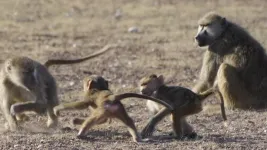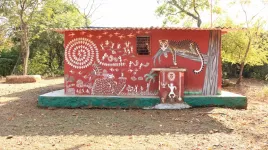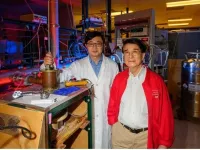(Press-News.org) Remember Napster? The peer-to-peer file sharing company, popular in the late 1990s and early 2000s, depended on users sharing their music files. To promote cooperation, such software "could mislead its users," says Bryce Morsky, a postdoc in Penn's School of Arts & Sciences.
Some file-sharing companies falsely asserted that all of their users were sharing. Or, they displayed the mean number of files shared per user, hiding the fact that some users were sharing a great deal and many others were not. Related online forums promoted the idea that sharing was both ethical and the norm. These tactics were effective in getting users to share because they tapped into innate human social norms of fairness.
That got Morsky thinking. "Commonly in the literature on cooperation, you need reciprocity to get cooperation, and you need to know the reputations of those you're interacting with," he says. "But Napster users were anonymous, and so there should have been widespread 'cheating'--people taking files without sharing--and yet cooperation still occurred. Evidently, obscuring the degree of cheating worked for Napster, but is this true more generally and is it sustainable?"
In a new paper in the journal Evolutionary Human Sciences, Morsky and Erol Akçay, an associate professor in the School of Arts & Sciences' Department of Biology, looked at this scenario: Could a cooperative community form and stabilize if the community's behaviors were masked? And would things change if the community members' true behaviors were eventually revealed?
Using a mathematical model to simulate the creation and maintenance of a community, their findings show, as in the example of Napster, that a degree of deceit or obfuscation does not impede and, indeed, can promote the formation of a cooperative community.
The researchers' modeling relied on an assumption that has been upheld time and time again, that humans are conditionally cooperative. "They will cooperate when others cooperate," Akçay says.
But the threshold of when someone will start cooperating differs from individual to individual. Some people will cooperate even when nobody else is, while others require most of the community to cooperate before they will do so too. Depending on the number of people with different cooperation thresholds, a community can wind up with either very high or very low levels of cooperation. "Our goal was to figure out, How can obfuscation act as a catalyst to get us to a highly cooperative community?" says Morsky.
To model this, the researchers envisioned a theoretical community in which individuals would join in a "naïve" state, believing that everyone else in the community is cooperating. As a result, most of them, too, begin cooperating.
At some point, however, the formerly naïve individuals become savvy and learn the true rate of cooperation in the community. Depending on their threshold of conditional cooperation, they may continue to cooperate, cheat, or get discouraged and leave the community.
In the model, when the researchers decreased the learning rate--or kept the true rate of cooperation in the group a secret for longer--they found that cooperation levels grew high, and savvy individuals quickly left the population. "And because those savvy individuals are the ones that don't cooperate as readily, that leaves only the individuals who are cooperating, so the average rate of cooperation gets very high," says Akçay.
Cooperative behavior could also come to dominate provided there was a steady inflow of naïve individuals into the population.
Akçay and Morsky note that their findings stand out from past research on cooperation.
"Typically when we and others have considered how to maintain cooperation, it's been thought that it's important to punish cheaters and to make that public to encourage others to cooperate," Morsky says. "But our study suggests that a side effect of public punishment is that it reveals how much or how little people are cooperating, so conditional cooperators may stop cooperating. You might be better off hiding the cheaters."
To continue exploring conditional cooperation, the researchers hope to follow with experiments with human participants as well as further modeling to reveal the tipping points for moving a group to either cooperate or not and how these tipping points could be changed by interventions. "You can see how conditional cooperation factors into behavior during this pandemic, for example," Akçay says. "If you think a lot of people are being careful (for example, wearing masks and social distancing), you might as well, but if the expectation is that not many people are being careful you may choose not to. Mask wearing is easy to observe, but other behaviors are harder, and that affects how the dynamics of these behaviors might unfold.
"This is a problem that humans have had to solve over and over again," he says. "Some amount of cooperation is required to have a society be worthwhile."
INFORMATION:
Erol Akçay is an associate professor in the University of Pennsylvania School of Arts & Sciences' Department of Biology.
Bryce Morsky is a postdoctoral fellow in the School of Arts & Sciences' Department of Biology at Penn.
The study was supported by the University of Pennsylvania.
As light detection and ranging (lidar) technology evolves, forest ecology and ecological restoration researchers have been using these tools in a wide range of applications.
"We needed an accounting of relative accuracy and errors among lidar platforms within a range of forest types and structural configurations," said associate professor Andrew Sánchez Meador, executive director of NAU's Ecological Restoration Institute (ERI).
Sánchez Meador led a study recently published in Remote Sensing, "Adjudicating Perspectives on Forest Structure: How Do Airborne, ...
Hundreds of millions of years ago, in the middle of what would eventually become Canada's Yukon Territory, an ocean swirled with armored trilobites, clam-like brachiopods and soft, squishy creatures akin to slugs and squid.
A trove of fossils and rock layers formed on that ancient ocean floor have now been unearthed by an international team of scientists along the banks of the Peel River a few hundred miles south of the Arctic's Beaufort Sea. The discovery reveals oxygen changes at the seafloor across nearly 120 million years of the early Paleozoic era, a time that fostered the most rapid development and diversification of complex, multi-cellular life in Earth's history.
"It's unheard of to have that much of Earth's history in one place," said Stanford University geological ...
Our gut microbiome -- the ever-changing "rainforest" of bacteria living in our intestines -- is primarily affected by our lifestyle, including what we eat or the medications we take, most studies show.
But a University of Notre Dame study has found a much greater genetic component at play than was once known.
In the study, published recently in END ...
Nonprofits and companies planting trees in the tropics may often pick species for their commercial rather than ecological value, researchers found in a new analysis of organizations' publicly available data. They also found many may not have tracked the trees' survival.
Tree planting is a promising, but controversial, restoration strategy for fighting climate change. A new study in the journal Biological Conservation provides a detailed look at what restoration organizations across the tropics are actually doing on the ground.
"We found some organizations placed an emphasis on biological diversity and forest restoration in their mission statements. When we looked at the species they reported ...
Major ecosystem changes like sea-level rise, desertification and lake warming are fueling uncertainty about the future. Many initiatives - such as those fighting to fully eradicate non-native species, or to combat wildfires - focus on actively resisting change to preserve a slice of the past.
However, resisting ecosystem transformation is not always a feasible approach. According to a new paper published today in the Ecological Society of America's journal Frontiers in Ecology and the Environment, accepting and directing ecosystem change are also viable responses, and should not necessarily be viewed as fallback options or as last resorts. The paper presents a set of guiding principles for applying a "RAD" strategy - a framework that involves ...
BENGALURU, India (July 8, 2021) - A new study led by WCS-India documents how a big cat deity worshipped by Indigenous Peoples facilitates coexistence between humans and leopards.
The study, published in a special issue of the journal Frontiers in Conservation Science: Human-Wildlife Dynamics called Understanding Coexistence with Wildlife documents how the Indigenous Warli people of Maharashtra, India, worship Waghoba, a leopard/tiger deity to gain protection from leopards, and how they have lived side-by-side with them for centuries (formerly tigers, too). The researchers have identified over 150 shrines dedicated ...
Researchers at Johns Hopkins Medicine have shown that a type of echocardiogram, a common test to evaluate whether a person's heart is pumping properly, may be useful in predicting which patients with COVID-19 are most at risk of developing atrial fibrillation -- an irregular heartbeat that can increase a person's risk for heart failure and stroke, among other heart issues. The new findings, END ...
Ever since the 1986 discovery that copper oxide materials, or cuprates, could carry electrical current with no loss at unexpectedly high temperatures, scientists have been looking for other unconventional superconductors that could operate even closer to room temperature. This would allow for a host of everyday applications that could transform society by making energy transmission more efficient, for instance.
Nickel oxides, or nickelates, seemed like a promising candidate. They're based on nickel, which sits next to copper on the periodic table, and the two elements have some common characteristics. It ...
Conditions in the tropical ocean affect weather patterns worldwide. The most well-known examples are El Niño or La Niña events, but scientists believe other key elements of the tropical climate remain undiscovered.
In a study recently published in Geophysical Research Letters, scientists from the University of Washington and NOAA's Pacific Marine Environmental Laboratory use remotely-piloted sailboats to gather data on cold air pools, or pockets of cooler air that form below tropical storm clouds.
"Atmospheric cold pools are cold air masses that flow outward beneath intense thunderstorms and alter the surrounding environment," ...
In a critical next step toward room-temperature superconductivity at ambient pressure, Paul Chu, Founding Director and Chief Scientist at the Texas Center for Superconductivity at the University of Houston (TcSUH), Liangzi Deng, research assistant professor of physics at TcSUH, and their colleagues at TcSUH conceived and developed a pressure-quench (PQ) technique that retains the pressure-enhanced and/or -induced high transition temperature (Tc) phase even after the removal of the applied pressure that generates this phase.
Pengcheng Dai, professor of physics and astronomy at Rice University and his group, and Yanming Ma, Dean of the College of Physics ...





